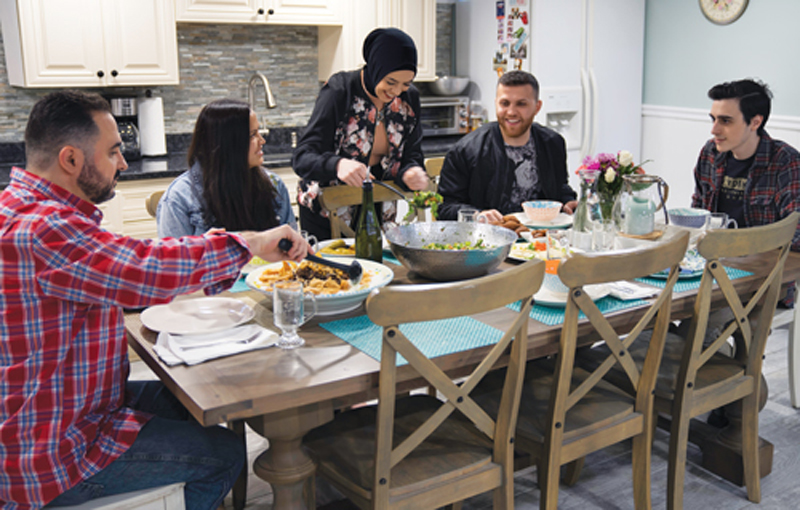
The clock strikes and it’s finally Iftar, the moment at sunset when Muslims across the world break their ritual Ramadan fast, having abstained from food and drink from dawn until dusk. Here, in their Dearborn home, the Sareinis recite a prayer before digging into their meal. Tonight, it’s Fred Sareini’s turn to read the supplication, a moment of quiet reflection spent thanking God for the food in front of them.
It’s a tradition he picked up from his father, but it’s not always just his task. His children; Lena, Jamila, and Ali, along with Jamila’s husband, Hatem Barakat, take turns. And if there are guests over — which is often — it becomes their duty.

In Michigan, Muslim-Americans make up nearly 3 percent of the state’s population. As an ethnically diverse community, food can serve as a window into the distinct cultural kaleidoscope, including Yemeni, African-American, Pakistani, and Bosnian dishes and traditions. This is most apparent during Ramadan, the ninth holy month of the Islamic calendar. Before dinner, Fred makes sure to snap a quick picture for his food blog. Both Catherine and Fred have pages on Instagram, highlighting halal eats around town (permissible by Islamic standards). Fred started his popular Instagram page @fsareini — described as a “… food guide on what the halal to eat” — because of Ramadan, capturing quick shots of family Iftar meals.
But Ramadan isn’t just about the food or fasting. Spiritual remembrance is always at the forefront. “There’s nothing like that feeling of hunger when you’re in your prayer,” Catherine says. “You really feel close to your Lord. You’re just grateful for everything that you have.” Fred says it’s also an opportunity to practice empathy for 30 days, from May 15-June 14 this year. During the third week of Ramadan, they participate in food drives, collecting items to deliver to families in need.

Dishes served in the Sareini household aren’t pegged to one specific culture. “Because Fred is Lebanese and I’m Irish, we don’t fall into any one food category. You can come and find spaghetti on one night or tacos on another,” says Catherine, curator of Iftar meals in the household. During suhoor time, or the meal before sunrise, the Sareinis even have their own trick for curbing thirst throughout the day while they fast: chia seeds soaked in coconut water.
However, there are some more traditional staples. “I believe her first Iftar we had fatteh and fattoush at my parents’ house and it became a tradition,” remembers Fred. Catherine, who converted to Islam 29 years ago, says that Lebanese fatteh, braised lamb with drizzled yogurt, is a must for the first day of Ramadan. It makes the inaugural day of fasting that much more special, especially because the whole family has a part to play in its production, from shopping for ingredients, to cooking in the kitchen and cleaning up afterwards.

The Sareinis are always experimenting with recipe possibilities and drawing inspiration from various sources. “If I tried something at anyone’s house and liked it, then I adopted it into our family,” Catherine says. During the week, they’ll constantly text in their family group chat about what to eat for Iftar that night. A fatoush salad of fresh vegetables, dried pita bread, and a peppery citrus dressing makes a daily appearance during Ramadan. And although the Sareinis don’t drink it often, jallab can be found at weekly family potlucks. The traditional Middle Eastern drink made of molasses, dates, and rosewater is something Fred’s parents love — especially his dad, who Fred calls the original foodie, before the title even existed.
For the Sareinis, Ramadan is changing as their food-loving family evolves.
“We have a lot of non-Muslim friends who we’ve met through Instagram,” Catherine says. “And we invite people to partake in Ramadan. Everyone’s looking forward to it this year, [and especially] what we call the ‘Suhoor Bakery Crawl.’”

Lena, a pastry chef at Detroit’s Selden Standard, describes Dearborn as coming alive in Ramadan nights. It’s a halal food mecca. Bakeries, hot dog stands, taco trucks, and coffee shops stay open well past midnight. That’s when the Sareini’s “crawl” begins. “Everyone will meet at our house, and we’ll go from bakery to bakery,” Catherine says. “You don’t even have to get in your car. You just walk up and down Michigan or Warren Avenue.” Stops include Saj Cafe and Bakery, with its selection of crispy Middle Eastern pastries, along with Kings Bakery, featuring savory meat pies.
Like many Muslim households in Michigan and beyond, the Iftar table is as much a communal junction as it is a spiritual one. “That’s when we see each other,” Catherine says. In the midst of work, school, and other duties, a shared meal and a reflective prayer are a Sareini family tradition. “We’ve always loved food,” says Catherine. “Food brought us together and food keeps us together.”
|
|
|









